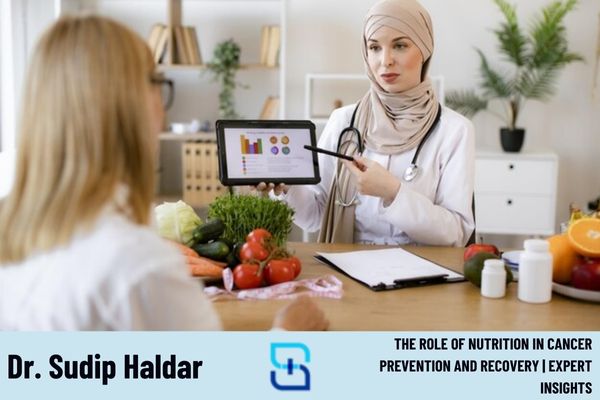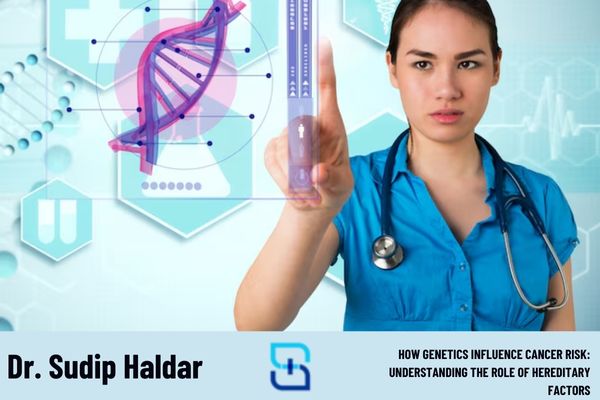The Role of Nutrition in Cancer Prevention and Recovery | Expert Insights
The Role of Nutrition in Cancer Prevention and Recovery | Insights from Dr. Sudip Haldar Cancer, with its complex nature and variety of forms, requires a multifaceted approach to prevention, treatment, and recovery. Among these approaches, nutrition is often overlooked but plays a crucial role in overall cancer care. Dr. Sudip Haldar, a renowned oncologist, emphasizes the importance of a balanced, nutrient-rich diet both in preventing cancer and in supporting patients through treatment and recovery. In this blog, we will explore how a well-planned nutrition strategy can empower individuals in the fight against cancer, improve quality of life, and promote healing during treatment. The Power of Nutrition in Cancer Prevention While there is no single food that can prevent cancer, scientific evidence strongly suggests that a balanced diet can help reduce the risk of cancer development. Dr. Sudip Haldar explains that a diet rich in plant-based foods, healthy fats, and lean proteins, coupled with regular exercise, plays an essential role in maintaining a healthy immune system, reducing inflammation, and supporting the body’s natural defense mechanisms. Cancer-Fighting Foods: By following a plant-based, anti-inflammatory diet, individuals can reduce their risk of developing cancer and promote overall well-being. Nutrition During Cancer Treatment: Fueling the Body for Healing Cancer treatments such as chemotherapy, radiation, and surgery can be physically draining, and maintaining proper nutrition is vital during this challenging period. Dr. Sudip Haldar emphasizes that good nutrition can help manage treatment side effects, improve energy levels, and strengthen the body’s ability to heal. Managing Side Effects of Treatment with Nutrition: Cancer treatments often cause side effects such as nausea, loss of appetite, and fatigue. However, proper dietary choices can help alleviate these symptoms and ensure that patients receive adequate nutrition. It’s important to stay hydrated as well, as treatments like chemotherapy and radiation can lead to dehydration. Drinking plenty of water and consuming hydrating foods like cucumbers, watermelon, and broths can help maintain fluid balance. Post-Treatment Nutrition: Supporting Recovery and Preventing Recurrence After cancer treatment, maintaining a healthy diet is essential for recovery and reducing the risk of recurrence. Dr. Sudip Haldar stresses the importance of focusing on a well-rounded diet that includes protein, healthy fats, fiber, and vitamins to restore strength, rebuild muscle mass, and support immune function. Key Nutrients for Post-Treatment Recovery: Incorporating antioxidant-rich foods such as berries, nuts, and leafy greens can help the body fight free radicals and reduce the oxidative stress caused by cancer treatments. The Importance of Professional Guidance in Nutrition While general guidelines are helpful, Dr. Sudip Haldar stresses that cancer patients should work closely with a dietitian or nutritionist who specializes in oncology. A registered dietitian can provide personalized advice, develop meal plans, and offer support to manage side effects related to cancer treatments. Additionally, a professional can help patients navigate any food sensitivities or changes in taste preferences that often occur during treatment. Conclusion Nutrition is not only about managing weight or eating for energy—it is a fundamental aspect of cancer prevention and recovery. By adopting a diet rich in fruits, vegetables, whole grains, and healthy fats, individuals can reduce their risk of cancer and support their body during treatment. Post-treatment, proper nutrition is crucial to rebuild strength and reduce the likelihood of recurrence. Dr. Sudip Haldar emphasizes that cancer care is not limited to medical treatments but encompasses holistic care, with nutrition playing a critical role in enhancing overall well-being. Working with healthcare professionals ensures that cancer patients are receiving the proper nutrition needed to aid recovery and promote long-term health. If you or a loved one is undergoing cancer treatment, consider seeking expert guidance on how nutrition can support your treatment journey and promote recovery. Proper nutrition can truly make a difference in the fight against cancer.
The Role of Nutrition in Cancer Prevention and Recovery | Expert Insights Read More »


